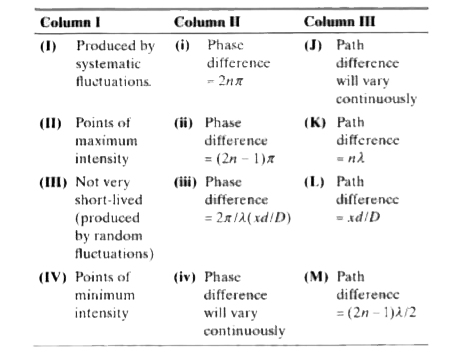What is the relation between path diff. and wavelength for constructive interference of two waves ?
To determine the relation between path difference and wavelength for constructive interference of two waves, we can follow these steps:
1. Understanding Path Difference:
- Path difference refers to the difference in distance traveled by two waves from their respective sources to a common point.
2. Condition for Constructive Interference:
- Constructive interference occurs when two waves meet in such a way that their crests align with crests and troughs align with troughs. This results in a wave of greater amplitude.
3. Mathematical Representation:
- For constructive interference, the path difference (Δx) must be an integer multiple of the wavelength (λ). Mathematically, this can be expressed as:
Δx=nλ
- Here, n is an integer (0, 1, 2, 3,...).
4. Interpretation of the Equation:
- The equation indicates that the path difference must equal 0, one full wavelength, two full wavelengths, etc., for constructive interference to occur. This means that the waves are in phase at the point of interference.
5. Examples:
- If n=0, then Δx=0 (waves start in phase).
- If n=1, then Δx=λ (one full wavelength difference).
- If n=2, then Δx=2λ (two full wavelengths difference), and so forth.
Final Relation:
Thus, the relation between path difference and wavelength for constructive interference of two waves is:
Δx=nλ(n=0,1,2,3,…)
- Path difference refers to the difference in distance traveled by two waves from their respective sources to a common point.
- Constructive interference occurs when two waves meet in such a way that their crests align with crests and troughs align with troughs. This results in a wave of greater amplitude.
- For constructive interference, the path difference (Δx) must be an integer multiple of the wavelength (λ). Mathematically, this can be expressed as:
Δx=nλ
- Here, n is an integer (0, 1, 2, 3,...).
- The equation indicates that the path difference must equal 0, one full wavelength, two full wavelengths, etc., for constructive interference to occur. This means that the waves are in phase at the point of interference.
- If n=0, then Δx=0 (waves start in phase).
- If n=1, then Δx=λ (one full wavelength difference).
- If n=2, then Δx=2λ (two full wavelengths difference), and so forth.
Thus, the relation between path difference and wavelength for constructive interference of two waves is:
Δx=nλ(n=0,1,2,3,…)
Topper's Solved these Questions
- OPTICSBook:PRADEEPChapter:OPTICSExercise:Very short answer question
Explore 5 Videos
- OPTICSBook:PRADEEPChapter:OPTICSExercise:very short answer questions
Explore 1 Video
- MAGNETIC EFFECT OF CURRENT AND MAGNETISMBook:PRADEEPChapter:MAGNETIC EFFECT OF CURRENT AND MAGNETISMExercise:Competition Focus (Multiple Choice Questions)
Explore 2 Videos
Similar Questions
Knowledge Check
What is the path difference of destructive interference
A(a) nλB(b) n(λ+1)C(c) (n+1)λ2D(d) (2n+1)λ2In a hall, a person receives direct sound waves from a source 120m away. He also receives waves from the same source which reach him after being reflected from the 25m high ceiling at a point halfway between them. The two waves interfere constructively for wavelengths (in metres)
A5,2,5,53....mB10,5,13.....mC2,203,4....mD10,103,2.....mInterference is an important property of light. In the given table, Column I shows the properties of interfering waves, Column II shows the phase difference, and Column III shows the path difference between two interfering waves

What are the conditions for constructive interference?A(I) (iv) (M)B(IV) (ii) (L)C(II) (i) (K)D(II) (i) (K)
What is the relation between phase difference and path difference ? The path difference at a point on the screen from two coherent sources is 5λ/2. Describe the possiblities of constructive and destructive interference at that point if the phase difference between the sources is either (i) π or (ii) 2π.
View SolutionObtain a relation between speed, frequency and wavelength of a wave.
View SolutionWhat is the relation between frequency and time period of a wave ?
View SolutionWhat is the relation between wavelength, speed and time period for a sound wave?
View SolutionWhat is the relation between frequency, wavelength and wave velocity ? Also give the relation between frequency and time period of a wave.
View Solution

